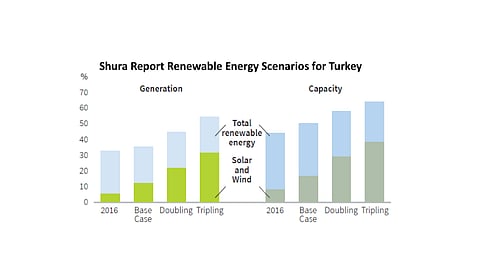

Wind and solar power alone could add 40 GW of renewable energy capacity in Turkey by 2026. This could well be done with the current planned transmission infrastructure investment. In its first report, recently launched Turkish think tank Shura Energy Transition Centre says that the government's current target for 2026 for 20 GW of wind and solar could be doubled to 40 GW.
The report, Increasing the Share of Renewables in Turkey's Power System: Options for Transmission Expansion and Flexibility, delves into the renewables market of Turkey and discusses its potential. For the purpose of the analysis, Shura's report spans the period from 2016 to 2026, offering three main scenarios:
Shura says that doubling the capacity is achievable with no additional cost, while the impact on redispatch and curtailment would be negligible. Moreover, it argues that total investment for expansion of the transmission grid and addition of transformer stations is around the same amount as earmarked by Turkey Electricity Transmission Company (TEIAS) – around €390 million ($463 million) annually.
Tripling the capacity from the base case scenario would entail selection of wind and solar generation sites based on local demand, grid capacity and increased system flexibility and resource quality, says Shura. Still, a rather moderate increase in investment of €430 million ($510 million) would have to be factored in, especially when taking a look at the dimension of the scenario.
In 2017, Turkey grid-connected a PV capacity of 1.79 GW, which turned the country into the largest solar market that year (see Europe Installed 8.61 GW PV In 2017). The capacity represents 1% of the total electricity generation in the country. Auctions had awarded pre-licenses to almost 5 GW of solar and wind power projects
The authors of the report suggest that increasing the share of renewables in the Turkish power sector would need a balanced and novel approach through 'market design, business models and financing'.
Shura Energy was founded by a partnership of the European Climate Foundation (ECF), Germany's well-known think tank Agora Energiewende and the Istanbul Policy Centre (IPC) within Sabanci University.
The report is available on the website of Shura.
